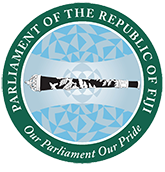Parliamentary committees are small groups of members of Parliament who work together to investigate and consider issues on behalf of Parliament. They are able to meet with people and call for documents to assist them in their work. They usually report their findings to Parliament and can make recommendations for changes to laws and administration. Parliament must officially respond to the recommendations made by Committees.
Standing committees in the Parliament of the Republic of Fiji
There are six standing committees of the Parliament and their functions are to –
- Examine Bills referred by the Parliament;
- Examine subordinate legislation tabled in Parliament;
- Scrutinise the operations of government departments;
- Consider petitions and papers presented;
- Review international treaties and conventions ratified by the Government; and
- Perform any other functions and duties as conferred.
The six standing committees are –
- Standing Committee on Economic Affairs;
- Standing Committee on Social Affairs;
- Standing Committee on Natural Resources;
- Standing Committee on Public Accounts;
- Standing Committee on Foreign Affairs and Defence; and
- Standing Committee on Justice, Law and Human Rights.
As outlined under the Constitution of the Republic of Fiji and further elaborated under the Standing Orders of the Parliament of the Republic of Fiji, Parliament and its Standing Committees must be open to the public, including the media, unless in exceptional circumstances when the Speaker has ordered the exclusion of the public on grounds that are reasonable and justifiable.
Select Committees
Select Committees primarily focus more on internal matters of Parliament. Parliament has the following select committees –
- Business Committee – which determines the business to be considered by Parliament each sitting day;
- House Committee – which considers the welfare and amenities for members;
- Privileges Committee – which considers breaches of privilege that may be committed by any person; and
- Standing Orders Committee – which reviews the Standing Orders and practices and procedures of Parliament.
Apart from the Standing and Select Committees, Parliament can also set up Special Committees to look into a particular issue of national concern. These are set up as the need arises and have a very specific mandate.



